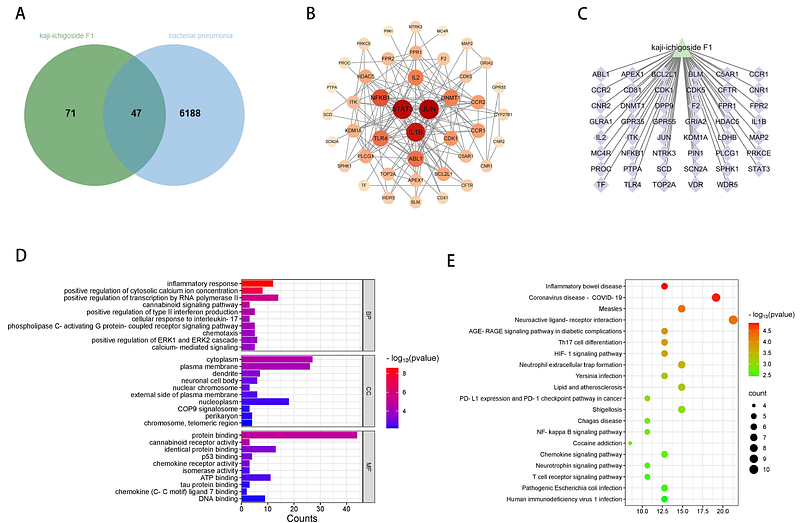Exploring the mechanism of kaji-ichigoside F1 on bacterial pneumonia based on the network pharmacology and transcriptome

Exploring the mechanism of kaji-ichigoside F1 on bacterial pneumonia based on the network pharmacology and transcriptome
Yang, J.; Yang, X.; Wu, L.; Min, C.
AbstractObjective: To explore the anti-inflammatory mechanism of kaji-ichigoside F1 against bacterial pneumonia based on transcriptomics and network pharmacology. Method: Network pharmacological was used to analyse the potential target genes of kaji-ichigoside F1 action on bacterial pneumonia; molecular docking was used to analyse the docking binding energy of kaji-ichigoside F1 with key target genes; RAW264.7 macrophages were treated with klebsiella pneumoniae fluid and given kaji-ichigoside F1 intervention, the expression of inflammatory factors IL-1{beta}, IL-6, TNF- and IL-10 were dectected by qRT-PCR; transcriptomic analysis was performed to obtain differentially expressed genes, and relevant signaling pathways. Result: Network pharmacological analysis showed that the five the key target genes for kaji-ichigoside F1-bacterial pneumonia interaction were were TLR4, NFKB1, STAT3, IL1B, and JUN; molecular docking results of kaji-ichigoside F1 with key target genes showed the docking binding energy ranging from -5.9 to -8.4 kcal/mol; kaji-ichigoside F1 can reduce the klebsiella pneumoniae induced inflammatory response of macrophages, manifested with reducing the mRNA expression of pro-inflammatory factors IL-1{beta}, IL-6 and TNF-, and increase the mRNA expression of anti-inflammatory factor IL-10; transcriptomics analysis showed that the signaling pathways involved were mainly the TLR signaling pathway and NFKB signaling pathway. Conclusion: This study showed that kaji-ichigoside F1 alleviates bacterial pneumonia by targeting TLR and NFKB signaling pathways, rebalancing macrophage polarization with suppressing pro-inflammatory cytokines and increasing anti-inflammatory cytokines, highlighting kaji-ichigoside F1 as a novel agent for combating bacterial infections.